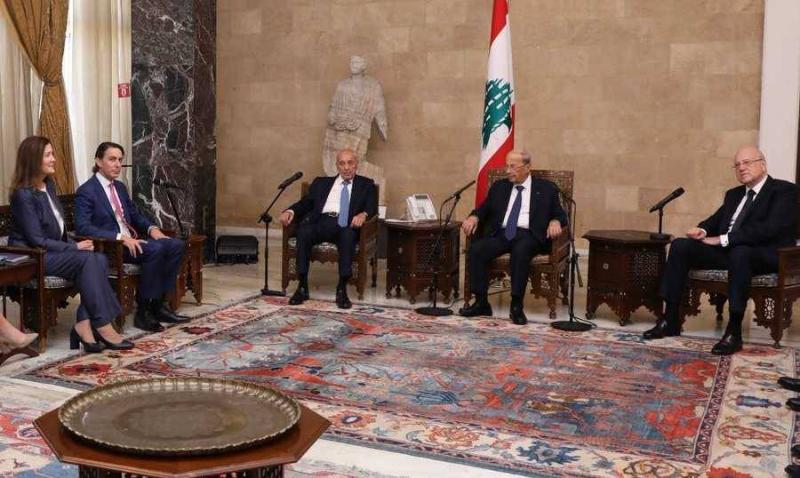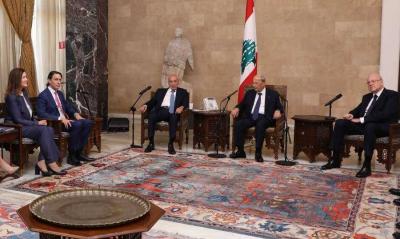The maritime border demarcation agreement with Israel is at the forefront of pressing internal challenges, especially with the certainty that the "September deadline" has lapsed and signing this agreement has become almost impossible during the remaining period of Aoun's presidency. Officials are awaiting the return of U.S. mediator Amos Hochstein to the region next weekend amidst information relayed by well-informed sources to "Nidaa Al-Watan" stating that he will not bring "final acceptance or outright rejection of the Lebanese proposal from the Israeli side," but there will be "renewed serious and positive intentions and a determination to reach an agreement that satisfies both Lebanese and Israeli sides, while simultaneously stressing that U.S. mediation in the demarcation will not be subjected to any time pressure under the threat of escalation."
As for official information regarding Hochstein's visit, sources involved in the negotiations told "Nidaa Al-Watan" that "Lebanon has yet to receive any new updates from the U.S. side apart from what is known regarding the continuation of matters on the right track," pointing out that "there is currently no specific date for his visit to Beirut," without ruling out the possibility of his arrival in the region next week. Regarding their expectations regarding the negotiation trajectory and the fate of the demarcation process, they responded: "As far as we know, the Lebanese proposal receives Israeli acceptance and U.S. support, but so far there is no tangible practical translation of the optimistic atmospheres being conveyed in the Israeli media," expressing their conviction that "the demarcation agreement will inevitably happen, but the main obstacle has become linked to the factor of internal Israeli contention in light of the legislative elections that reject turning this agreement into a moral victory for Hezbollah in the event of demarcation under threats from drones and threats to strike Israeli oil facilities."
The caretaker Minister of Energy Walid Fayad informed "Al-Jumhuriya" that it is clear that the French company "Total" and the Italian company "Eni" cannot begin operations in the Lebanese blocks without obtaining guarantees from the United States and Tel Aviv, out of concern for their interests. This explains the importance of the equation: "Either extract gas and oil on both sides, or no extraction here nor there." Fayad confirmed that "what we require is to eat the grapes, not to kill the caretaker, and we await the outcome of the important mission of U.S. mediator Amos Hochstein, hoping that he brings us the grapes."
In turn, "Al-Akhbar" pointed out that the atmosphere of caution and uncertainty surrounding the maritime border demarcation file between Lebanon and the occupied Palestinian territories witnessed a "breakthrough" following the statement from the White House the day before yesterday about U.S. President Joe Biden's call to the Israeli Prime Minister Yair Lapid urging him to proceed with negotiations leading to a quick agreement with Lebanon. Meanwhile, recent information reports that U.S. mediator Amos Hochstein held a meeting yesterday with the Israeli team via Zoom, while maintaining constant communication with Deputy Speaker Elias Bou Saab as the representative of President Michel Aoun in this file, during which the U.S. Ambassador in Beirut, Dorothy Shea, is in contact with the advisors to the heads of the parliamentary council and the government regarding the latest communications.
Informed sources attributed the White House statement to several reasons, including:
- The worsening gas crisis in Europe following recent Russian measures to stop supplies, leading to calls in Europe to rethink dealings with Russia, amidst rising fears about the implications of the energy crisis on these countries as winter approaches. Therefore, the U.S. interest lies in hastening access to gas from the Eastern Mediterranean region to compensate for a portion of halted Russian gas supplies.
- Assurances to the Israeli Prime Minister that Washington will stand by him in any decision he takes quickly to help him overcome internal pressures ahead of the parliamentary elections to be held in the entity at the beginning of November. In this context, information indicates that the Americans have informed opposition leader Benjamin Netanyahu that the demarcation file with Lebanon is a matter of global energy security and is not subject to electoral bidding, and that what Lapid's government is doing serves the Israeli interest, in a step interpreted as helping Lapid's government confront internal pressures.
- The U.S. confirmed the accuracy of the situation on the ground, having received credible data from Israel and Lebanon and other sources about the serious threats from Hezbollah, indicating that any confrontation, regardless of its outcome, would result in a loss of the necessary security stability for exploration and extraction operations and would lead to all companies exiting the area.
- Sending a signal to Lebanon that Washington is committed to working diligently toward completing the agreement and that Biden is personally intervening to assist Hochstein in fulfilling his mission.
In the meantime, Israeli media continued to speak of a forthcoming agreement and a deal through which Israel would receive financial compensation in exchange for relinquishing the Qana field. It seems clear that Hochstein's mission is now focused on devising an agreement framework that does not make it appear that Israel has yielded to Hezbollah's threats. According to the information, Hochstein will prepare a settlement proposal based on his recent discussions with Israeli and Lebanese officials, and if he receives satisfactory responses, he will set a date for his visit to the region.
"Al-Akhbar" learned that Hochstein recently held a meeting with the National Security Advisor to French President Emmanuel Macron, focusing on Europe's role and France's role in encouraging Total to announce its readiness to work in the Lebanese fields. He is studying with the French a "solution formula" that makes Israel appear to benefit even if it comes at the expense of corporate profits as long as Lebanon will not accept ceding any part of the Qana field and will not agree to any commercial partnership or any participation at the level of the operating companies. Sources close to Total indicated that it cannot guarantee full readiness to start working in Lebanon due to its commitments elsewhere, noting that representatives from the company recently informed Energy Minister Walid Fayad that "Total will not take any step before signing the agreement and obtaining guarantees from both sides of no military escalation," expressing its readiness to spend $50 million immediately upon the announcement of the agreement as part of a plan to resume exploration projects in several Lebanese fields.




